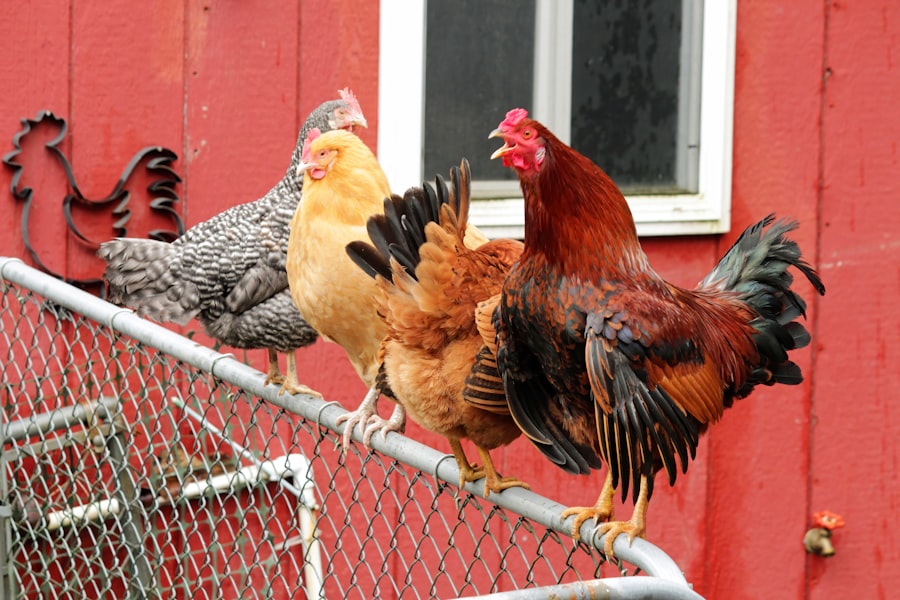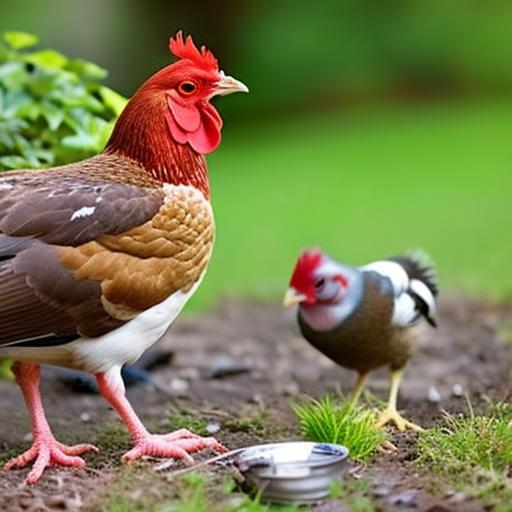Natural chicken keeping is a growing trend among backyard chicken enthusiasts. It involves raising chickens in a way that mimics their natural habitat and allows them to exhibit their natural behaviors. This approach focuses on providing a healthy and stress-free environment for the chickens, which in turn leads to healthier and happier birds.
The popularity of natural chicken keeping can be attributed to several factors. First and foremost, it allows individuals to have a fresh supply of eggs right in their own backyard. This not only ensures a constant source of high-quality eggs but also reduces the reliance on store-bought eggs, which may come from chickens raised in less than ideal conditions.
Additionally, raising backyard chickens can help reduce food waste. Chickens are excellent at consuming kitchen scraps and leftovers, turning them into nutrient-rich manure for the garden. This not only reduces the amount of waste that goes into landfills but also provides a sustainable source of fertilizer for plants.
Key Takeaways
- Natural chicken keeping is a sustainable and rewarding way to raise chickens in your backyard.
- Raising backyard chickens provides fresh eggs, natural pest control, and fertilizer for your garden.
- Choosing the right breed for your backyard depends on your climate, space, and egg-laying preferences.
- Building a chicken coop requires proper planning, materials, and ventilation to ensure a healthy environment for your chickens.
- Feeding your chickens a natural diet of grains, vegetables, and insects can improve their health and egg quality.
Benefits of Raising Backyard Chickens
There are numerous benefits to raising backyard chickens beyond the obvious supply of fresh eggs. One of the most significant advantages is the natural pest control they provide. Chickens love to forage and eat insects, making them excellent at controlling pests in the garden. They can help reduce the population of harmful insects such as slugs, snails, and even ticks.
Furthermore, chickens are great composters. Their manure is rich in nitrogen and other nutrients, making it an excellent addition to compost piles. By adding chicken manure to your compost, you can speed up the decomposition process and create nutrient-rich compost for your garden.
Another benefit of raising backyard chickens is the educational value it provides, especially for children. By caring for chickens, children learn about responsibility, compassion, and where their food comes from. They also get to witness firsthand the life cycle of a chicken, from hatching to laying eggs.
Choosing the Right Breed for Your Backyard
When it comes to choosing the right breed for your backyard, there are several factors to consider. The first is climate. Some chicken breeds are better suited to cold climates, while others thrive in warmer regions. It’s important to choose a breed that can withstand the temperature extremes of your area.
Space is another crucial factor to consider. If you have a small backyard, you’ll want to choose a breed that doesn’t require a lot of space to roam. Bantam breeds, such as Silkies or Polish, are great options for small yards. On the other hand, if you have a large property, you may opt for larger breeds like Rhode Island Reds or Sussex.
Egg-laying capabilities are also an important consideration. If your main goal is to have a steady supply of eggs, you’ll want to choose a breed known for its high egg production. Breeds like Leghorns or Australorps are excellent layers and can provide you with plenty of eggs throughout the year.
Building Your Own Chicken Coop
Building your own chicken coop can be a rewarding and cost-effective option. When designing your coop, there are several factors to consider. The first is materials. You’ll want to choose materials that are durable and easy to clean. Common options include wood, metal, or plastic.
Size is another important consideration. The general rule of thumb is to allow at least 4 square feet of space per chicken inside the coop and 10 square feet per chicken in the outdoor run. This ensures that the chickens have enough space to move around comfortably.
Design is also crucial when building a chicken coop. It should include features such as nesting boxes for egg-laying, roosting bars for sleeping, and adequate ventilation for good air flow. Additionally, it’s important to include predator-proofing measures such as secure fencing and locks on doors and windows.
The Importance of Proper Ventilation in Chicken Coops
Proper ventilation is essential for maintaining a healthy and comfortable environment inside the chicken coop. Good ventilation helps remove excess moisture, ammonia, and odors, which can lead to respiratory issues and other health problems in chickens.
To ensure proper ventilation, it’s important to have openings for fresh air to enter the coop and stale air to exit. This can be achieved through windows, vents, or even small gaps in the walls. It’s also important to avoid drafts, as they can cause stress and discomfort for the chickens.
In addition to providing good air flow, ventilation also helps regulate temperature inside the coop. During hot summer months, proper ventilation helps prevent overheating, while in colder months, it helps prevent condensation and frostbite.
Feeding Your Chickens Naturally

Feeding your chickens a natural diet is not only healthier for them but also results in better-tasting eggs. Chickens are omnivores and thrive on a varied diet that includes grains, vegetables, fruits, insects, and even small amounts of meat.
One of the easiest ways to incorporate natural foods into their diet is by allowing them to free-range. This allows them to forage for insects, worms, and plants, which provide essential nutrients. However, if free-ranging is not an option, you can supplement their diet with kitchen scraps and garden produce.
It’s important to note that while chickens can eat a wide variety of foods, there are some items that should be avoided. These include chocolate, caffeine, avocado, onions, and raw beans. Additionally, it’s important to provide a balanced diet that includes a good quality chicken feed as the base.
Maintaining a Clean and Healthy Chicken Coop
Maintaining a clean and healthy chicken coop is crucial for the overall well-being of your flock. A clean coop helps prevent the spread of diseases and parasites and ensures that the chickens have a comfortable living environment.
Regular cleaning is essential. This includes removing soiled bedding, cleaning and disinfecting the coop, and regularly checking for signs of pests or disease. It’s also important to provide fresh bedding, such as straw or wood shavings, to keep the coop clean and dry.
In addition to regular cleaning, it’s important to practice good biosecurity measures. This includes limiting access to the coop to prevent the introduction of diseases or pests. It’s also important to quarantine new birds before introducing them to the flock to ensure they are healthy.
Protecting Your Flock from Predators
Predators can pose a significant threat to your flock, so it’s important to take measures to protect them. Common predators include raccoons, foxes, coyotes, and even neighborhood dogs or cats.
One of the most effective ways to protect your flock is by securing the coop and run with sturdy fencing. This can be achieved by using hardware cloth or welded wire mesh with small openings that predators cannot squeeze through. It’s also important to bury the fencing at least 12 inches deep to prevent predators from digging under it.
Additionally, it’s important to secure all openings in the coop, such as windows and doors, with predator-proof locks. This helps prevent predators from gaining access to the coop during the night when chickens are most vulnerable.
Understanding Chicken Behavior and Communication
Understanding chicken behavior and communication is essential for providing proper care and addressing any issues that may arise. Chickens communicate through body language and vocalizations.
Some common body language cues include flapping wings, which can indicate excitement or aggression, and tail wagging, which is a sign of contentment. Vocalizations can range from clucking, which is a sign of contentment or calling for attention, to squawking, which can indicate distress or danger.
By observing their behavior and vocalizations, you can better understand their needs and address any potential issues. For example, if a chicken is constantly pecking at another chicken, it may be a sign of aggression or bullying and may require intervention.
Harvesting and Using Fresh Eggs from Your Backyard Chickens
Harvesting and using fresh eggs from your backyard chickens is one of the most rewarding aspects of natural chicken keeping. To ensure the eggs are safe to eat, it’s important to collect them regularly and store them properly.
Collecting eggs daily helps prevent them from getting dirty or cracked, which can lead to contamination. It’s also important to wash the eggs before using them, as this removes any dirt or bacteria that may be present on the shell.
When it comes to storing eggs, it’s best to keep them in a cool and dry place, such as the refrigerator. This helps prolong their freshness and reduces the risk of spoilage. It’s important to note that eggs should be stored with the pointed end down to help maintain their quality.
Natural chicken keeping offers numerous benefits for backyard chicken enthusiasts. From having a fresh supply of eggs to reducing food waste and providing natural pest control, raising backyard chickens can be a rewarding and sustainable endeavor. By choosing the right breed, building a proper coop, providing good ventilation, feeding a natural diet, maintaining cleanliness, protecting from predators, understanding behavior, and properly harvesting and using fresh eggs, individuals can create a healthy and happy environment for their flock. So why not give natural chicken keeping a try and experience the joys of raising your own chickens?
If you’re interested in natural chicken keeping and want to provide your backyard chickens with a unique and fun environment, you should check out the article on the “Chicken Coop Trampoline” on Poultry Wizard’s website. This innovative design combines a traditional chicken coop with a trampoline, allowing your chickens to enjoy bouncing and playing while still being safe and secure. It’s a great way to keep your chickens entertained and active while also providing them with a comfortable living space. To learn more about this creative chicken coop design, click here.
FAQs
What is natural chicken keeping?
Natural chicken keeping is a method of raising chickens that focuses on providing them with a natural and healthy environment. This includes allowing them to free-range, providing them with a balanced diet, and avoiding the use of chemicals and antibiotics.
What are the benefits of backyard chickens?
Backyard chickens can provide a source of fresh eggs, help control pests in the garden, and provide fertilizer for plants. They can also be a fun and educational hobby for families.
What do backyard chickens need to be healthy?
Backyard chickens need access to fresh water, a balanced diet of feed and natural forage, a clean and dry coop, and protection from predators. They also need regular health checks and care to prevent and treat any illnesses.
What are some common health issues for backyard chickens?
Common health issues for backyard chickens include respiratory infections, parasites, and egg-laying problems. It is important to regularly check for signs of illness and seek veterinary care if necessary.
What should I consider before getting backyard chickens?
Before getting backyard chickens, it is important to check local laws and regulations, consider the amount of space and time you have available, and research the care and maintenance required. It is also important to consider the potential noise and odor that may come with raising chickens.
Meet Walter, the feathered-friend fanatic of Florida! Nestled in the sunshine state, Walter struts through life with his feathered companions, clucking his way to happiness. With a coop that’s fancier than a five-star hotel, he’s the Don Juan of the chicken world. When he’s not teaching his hens to do the cha-cha, you’ll find him in a heated debate with his prized rooster, Sir Clucks-a-Lot. Walter’s poultry passion is no yolk; he’s the sunny-side-up guy you never knew you needed in your flock of friends!







